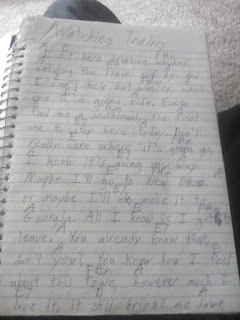As a musician with aspirations of turning one's skill into a professional, there are several things to consider that will help get you launched. For starters...
6. It's important to maintain a professional mindset
This might seem like a no-brainer, but self-discipline isn't always easy. If you wanna be a professional, you have to act like one. If you want playing music to be your job, you have to treat it as such.
This means practicing regularly, continuing to learn as much new stuff - chords, songs, instruments, etc. - as you can, spending time producing new material, doing the footwork to book shows, promoting, recording, and maintaining connections, and a whole lot more.
If you expect to earn from your artistic endevors, you must realize you are an entrepreneur running a business, and you've got a lot of competition. It takes a lot of work to be in the running.
5. Busking is a great way to earn cash while practicing your performer skills
While not for everyone, busking can be a great way to earn extra cash in the city. This is the primary - or sometimes only - source of income for many people. For the struggling, jobless, or touring musician, busking is an ideal way to earn immediate dollars from musical ability.
In addition, busking is great performance practice. Busking puts you in front of passing crowds. When you, as the performer, are not the center of everyone's attention - as would be the case on stage - some may find it easier to play to the decentralized audience of people just passing by.
4. Getting your first shows
It can be hard to book your first shows, but once the ball is rolling, venues will be more willing to work with you.
It is good to make connections with other musicians in your area that play similar music to your own style. Maybe these other musicians can help introduce you to venues, or get you on some of their shows. Venues may also be more likely to book you if you've already got a full bill, so it helps to have a another artist you are working with to book shows. Open mics, music groups, songwriter circles, and shows you get booked on are great places to connect with other musicians.
The music scene in many cities is built upon a foundation of house shows, and you may find playing these types of shows a necessary step to break into the local scene and get into other, more established venues. Even if house shows are not a big part of your local music scene, playing them can be a valuable experience - as house shows are often more intimate performing atmospheres, and are also great opportunities to meet other musicians.
3. Merchandise makes money
Once you start playing shows, you'll probably want to make money from your performance. Perhaps the best way to achieve this is by having merchandise to sell.
People love physical objects. It helps them feel better about spending money, because then they have something to show for it - the live experience not always enough for people, especially when musician or band is still trying to make a name for themselves.
Merchandise also shows people that you are taking yourself seriously as a musician, which in turn makes those other people take you more seriously, too.
It doesn't matter what kind of merchandise you start working with - I started with just stickers, and people have been just as willing to make donations for them. Other merchandise to consider having includes t-shirts, patches, CDs - even if they're just burnt discs in cardboard cases, or whatever else you might want as merchandise.
Besides, then you'll have people repping your music.
2. Social media presence is important
We live in a digital age. You're reading this article on my blog, probably on your cellphone or tablet, or maybe a laptop. Technology and social media have both become major parts of many people's lives. Maintaining a social media presence is vital for any artist.
Websites like Facebook, Twitter, and YouTube are great channels to keep people up-to-date with what you're doing. People love being able to follow stories from other people's lives, as it allows them to live vicariously through the other people - which is why much of what's on tv is so popular.
Many places, like different venues and record labels, will also not work with you if you cannot show them a social media presence and following.
1. Keep at it
This goes back to having a professional mindset. Artistic careers are like snowballs rolling down a hill - the further the ball rolls, the more size and momentum it picks up. Once you get the ball rolling on your musical career, it's important to keep it going. Keep booking and playing shows, writing and learning new material, promoting your shows and merchandise, and keeping your social media networks updated.
This repetition will help keep you relevant, and in work. Also, the longer you work on building your audience, the more your audience will grow - and the longer you work on your craft, the better at it you'll get.
Check out album reviews of
Robber's Roost's "Swallow Your Fears" and
SILVIS'S "Little Brothers"






















































